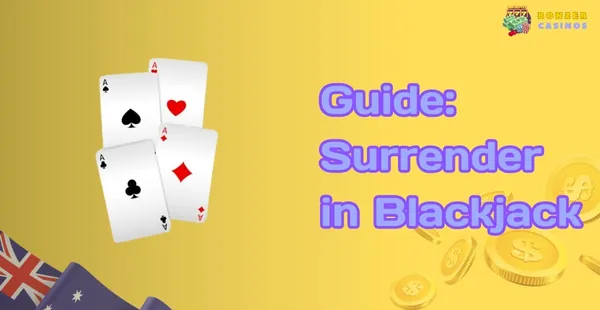Casino Guides: Mastering Surrender in Blackjack
The key to blackjack excitement is the blend of skillfulness and strategy: every decision you take can change the feeling of being tilted in your favor. Today we are going to cover a powerful but underutilized tactic: the surrender. It’s not about giving up; rather, it’s about preserving your bankroll and positioning yourself for long-term success. Get ready to learn exactly how, when, and why surrendering might be the best play at blackjack.

Understanding Surrender
Surrender lets you ditch a hand (and 50% of an original stake) rather than risk the full value. This strategy has not been as common as it used to be earlier but is still available in specific game variants offered in online AUS casinos.
Early vs. Late Surrender
There are two types of surrenders we need to highlight. Both can be used in different situations in the game. Here are they:
- Early ones are the better option. This is when you fold your hand before the dealer checks for a blackjack. That is if the croupier has natural blackjack (an Ace and a 10-value card), then you will not lose your total bet but only half of it. Due to the favorable position toward gamers, early surrender is seldom seen and only occasionally allowed on certain game types or at high-limit tables;
- In late one, Aussie gamblers can only fold their hands after the croupier has checked for blackjack. However, if the dealer opens with a natural one, surrendering is not possible and gamers forfeit the entire stake. However, if the croupier doesn’t have blackjack, you are able to surrender, forfeiting 50% of your stake. While not as prevalent, late strategy is often included in online game variants and on casino tables with four or more decks.
Why Use Surrender? The Specs Behind the Tactic
Surrender can help you lower your potential losses, but why? Let’s see the answer to why this strategy could be a total game-changer.
Minimizing Inevitable Losses
One of the main reasons to surrender is to limit losses. Here is an example of how it works:
- In the case that you are dealt a hard 16 (one of the weakest hands) against a dealer showing a 10 or an Ace if you were to surrender then you would only lose 50% of the stake;
- This prevents you from completely losing the bankroll and may give you a line of activity in difficult rounds.
A Calculated Move, Not a Sign of Defeat
Many players mistakenly view surrender as a retreat, yet it’s anything but. When you face unfavorable odds, surrender shows a deep understanding of blackjack probabilities and a commitment to long-term success. Game professionals frequently use this strategy because they know that reducing losses can be as beneficial as chasing wins.
Strengthening Your Tactic
Surrender is part of the blackjack tactic at a more advanced level. Many studies and simulations show that giving up a hard 16 versus a dealer’s 10 or an Ace greatly reduces the house edge. Over time, these small tactical decisions add up and tip the odds just enough to improve your chances of coming out on top.
When to Surrender: Key Situations for Maximum Benefit
To know when to surrender is a skill that takes practice and experience. Below are the optimal cases to keep in mind using this approach, based on blackjack probability and risk assessment:
- Hard 16 Against Dealer’s 9, 10, or Ace. The hard 16 is one of the most challenging hands to play. Against a dealer’s 9, 10, or Ace, the odds are heavily stacked against you, so surrender is the most ripper choice. This move will minimize your losses and allow you to stay in the game with a better balance;
- Hard 15 Against Dealer’s 10. When you’re dealt a hard 15 against a dealer who shows a 10, your options are limited, and the chances of busting are high. Surrendering half of your bet in this scenario is a more favorable choice than risking a likely loss of the full amount.
Situations When You Should Not Use the Rule
Surrender is powerful but will not always be the right move. Here are some instances when you should avoid surrendering:
- You are holding a Strong Hand. Like a pair of 8s, surrendering a strong hand is generally unwise. In this case, splitting the 8s is a better choice, as it allows you to play two hands with a higher probability of winning. Similarly, soft hands, like Ace-6 or Ace-7, offer flexibility and can often be improved with a hit;
- Dealer Shows a Weak Upcard (2-7). If the dealer has a weak upcard, such as a 2 through 7, surrender is usually not the best move. The likelihood of the dealer bust is higher in these cases which gives you a better chance to win without surrendering;
- When Surrender Isn’t an Option. In games that don’t offer such a feature, you’ll need to adapt your strategy to include alternatives: double down, split, or choose between hitting and standing.
Integrating Surrender into Your Strategy: Basic Strategy Chart
An effortless strategy chart is extremely valuable here to make surrender decisions as easy as possible. This chart simplifies complex decision-making, as it offers clear guidance on what to do based on your hand and the dealer’s upcard. Here is a guide based on the most common surrender situations.
| Gamer’s Hand | Dealer’s Upcard | Recommended Action |
| Hard 16 | 9, 10, Ace | Surrender |
| Hard 15 | 10 | Surrender |
Using Surrender in Online Blackjack: A Step-by-Step Guide
Rules for using this approach are easy to understand. Most online casinos in Australia feature graphical prompts that make surrender options a cinch to execute:
Look for an on-screen “Surrender” button, available when this is a viable option.
Tap on it. The game will prompt you to confirm to avoid accidental selections.
Once confirmed, half of your initial bet is returned, and your hand is removed from play.
Advanced Surrender Tips for Seasoned Australian Gamblers
Professional players from Oz realize that timing is key with blackjack. So here are some advanced tips to get the most out of your gambling:
- By knowing how the dealer plays, you can help decipher the power of their hand and determine whether it is in your favor to surrender. For instance, it can be useful to note how frequently a dealer breaks on weaker hands;
- In multi-deck games, the probability of certain outcomes shifts slightly. In such cases, knowing whether surrender is advantageous might require using more nuanced strategy charts specific to multi-deck games.
Exploring Variations: Surrender in Different Blackjack Variants
However, surrender rules are not universally applied across the board because not all blackjack games are created equal. Here are some popular blackjack variations where such bets might be different:
- European Blackjack. Does not offer such a bet, as gameplay requires other strategies;
- Spanish 21. Often incorporates late surrender and features alternative guidelines for doubling down and splitting;
- Atlantic City Blackjack. Often includes late surrender, as well as several additional rules that favor the player, such as allowing splits to be re-split and even double after a split.
You Might Also Want to Know Casino Guides: Blackjack Strategies
Final Thoughts: Make Surrendering Part of Your Blackjack Arsenal
To win in blackjack does not mean to hit 21 all the time. It is often about making calculated moves, including knowing when to surrender. You will play smarter and last longer at the table if surrender is part of the approach. So the next time you have a difficult hand, remember that surrendering may give you the best chance at winning in the long run.
 Caleb White
Caleb WhiteCasino Expert | Caleb White is the author who will tell you how to choose a safe gaming site.
FAQ
Can surrender be used in every blackjack variant?
No, not all blackjack games offer such a bet. It’s more common in multi-deck games, often with four or more decks. Be sure to check the specific rules of the table or game you’re playing.
How does surrender work in single-deck or double-deck blackjack games?
Surrender is rarely offered in single-deck or double-deck blackjack games, as these games typically have a lower house edge. If it is offered, the strategy remains similar but may be adjusted to the game’s specific odds and dynamics.
How do I know if a game offers early or late surrender?
You can usually find this information in the game rules or by asking the dealer in a physical casino. In online games, the help or info section will often specify such info.
